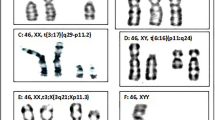Abstract
Purpose
The purpose of the present study was to investigate the contribution of chromosomal anomalies and the frequency of a particular type of aberration in couples with recurrent miscarriages.
Methods
A total of 1,162 couples with recurrent miscarriages were analyzed using G-banding and Fluorescence in situ hybridization where ever necessary.
Results
Chromosomal anomalies were detected in 78 cases. This study describes majority of the cases with balanced reciprocal translocations. Among the abnormal karyotypes we also report for the first time three unique translocations involving (3;14), (18;22) and (X;22) chromosomes which were confirmed by molecular cytogenetic methods.
Conclusions
The review of literature and the overall incidence of the abnormalities suggest that chromosomal analysis in couples with recurrent miscarriages should be taken up by all the practioners at all levels. This not only helps to check the cytological abnormalities but also helps to correlate the recurrent abnormalities in a given population. Thus establishing and correlating the environmental and genetic condition of that particular phenotype and genotype.
Similar content being viewed by others
References
Royal College of Obstetricians and Gynecologists. The management of recurrent miscarriage. London: Royal College of Obstetricians and Gynecologists; 1998.
Stephenson MD. Frequency of factors associated with habitual abortion in 197 couples. Fertil Steril. 1996;66:24–7.
Fryns JP, Van Buggenhout G. Structural chromosome rearrangements in couples with recurrent fetal wastage. Eur J Obstet Gynecol Reprod Biol. 1998;81:171–6.
Elghezal H, Hidar S, Mougou S, Khairi H, Saad A. Prevalence of chromosomal abnormalities in couples with recurrent miscarriage. Fertil Steril. 2007;88:721–3.
Rao L, Murthy K, Babu A, Venkata P, Deenadayal M, Singh L. Chromosome inversions and a novel chromosome insertion associated with recurrent miscarriages in South India. Arch Gynecol Obstet. 2005;272:273–7.
Licher P, Cremer T, Borden J, Manuelidis L, Ward DC. Delineation of individual human chromosomes in metaphase and interphase cells by in situ suppression hybridization using recombinant DNA libraries. Hum Genet. 1988;80:224–34.
Pinkel D, Landegent J, Collins C, Fuscoe J, Segraves R, Lucas J, et al. Fluorescence in situ hybridization with human chromosome specific libraries: detection of trisomy 21 and translocations of chromosome 4. Proc Natl Acad Sci USA. 1988;85:9138–42.
Rubio C, Pehlivan T, Rodrigo L, Simon C, Remohi J, Pellicer A. Embryo aneuploidy screening for unexplained recurrent miscarriages. Am J Reprod Immunol. 2005;53:159–65.
Gadow EC, Lippold S, Otano L, Srafin E, Scarpati R, Matayoshi T. Chromosome rearrangements among couples with pregnancy losses and other adverse reproductive outcomes. Am J Med Genet. 1991;41:279–81.
Kavalier F. Investigation of recurrent miscarriages. BMJ. 2005;331:121–2.
Mozdarani H, Meybodi AM, Zari-Moradi S. A cytogenetic study of couples with recurrent spontaneous abortions and infertile patients with recurrent IVF/ICSI failure. Indian J Hum Genet. 2008;14:1–5.
Schwartz S, Palmer CG. Chromosomal findings in 164 couples with repeated spontaneous abortions: with special considerations to prior reproductive history. Hum Genet. 1983;63:28–34.
Boue A, Gallano P. A collaborative study of the segregation of inherited chromosomal structural rearrangements in 1356 prenatal diagnosis. Prenat Diagn. 1984;4:45–67.
Rowley PT, Marshall R, Ellis JR. Genetic and cytological study of repeated spontaneous abortion. Ann Hum Genet. 1963;27:78–100.
Khudr G. Cytogenetics of habitual abortion: a review. Obstet Gynecol Surv. 1974;29:299–310.
Dubey S, Chowdary MR, Prahlad B, Kumar V, Mathur R, Hamilton S, et al. Cytogenetic causes for recurrent spontaneous abortions-An experience of 742 couples (1484 cases). Indian J Hum Genet. 2005;11:94–8.
Akgul M, Ozkinay D, Ercal D, Cogulu O, Dogan O, Altay B, et al. Cytogenetic abnormalities in 179 cases with male infertility in Western Region of Turkey: report and review. J Assist Reprod Genet. 2009;26:119–22.
Tavokina LV, Baronova EV, Sopko NI. The most frequent chromosomal abnormalities in karyotypes of patients with reproductive disorders. Cytol Genet. 2007;41:237–42.
Bourrouillou G, Colombies P, Dastugue N. Chomosome studies in 2136 couples with spontaneous abortions. Hum Genet. 1986;74:399–401.
Rajangam S, Tilak P, Aruna N. Rema devi: Karyotyping and counseling in bad obstetric history and infertility. Iranian J Reprod Med. 2007;5:7–12.
Amudha S, Aruna N, Rajangam S. Consanguinity and chromosomal abnormality. Indian J Hum Genet. 2005;11:108–10.
Espinoza JP, Anguiano LO, Rivera H. Chromosomal abnormalities in couples with reproductive disorders. Gynecol Obstet Investig. 2008;66:237–40.
Neri G, Serra A, Campana M, Tedeschi B. Reproductive risks for translocation carriers: cytogenetic study and analysis of pregnancy outcome in 58 families. Am J Med Genet. 1983;16:535–61.
De Braekeleer M, Dao TN. Cytogenetic studies in couples experiencing repeated pregnancy losses. Hum Reprod. 1990;5:519–28.
Campana M, Serra A, Neri G. Role of chromosome aberrations in recurrent abortions: a study of 269 balanced translocations. Am J Med Genet. 1986;24:341–56.
Tibiletti MG, Simoni G, Terzoli GL, Romitti L, Fedele L, Candiani GB. Pericentric inversion of chromosome 9 in couples with repeated spontaneous abortion. Acta Eur Fertil. 1981;12:245–8.
Portnoi MF, van den Akker J, Le Porrier N, Youssef S, Taillemite JL. A new case of ring chromosome 9. Sem Hôp. 1983;59:185–8.
Acknowledgements
This study was supported by a core grant to the Centre for DNA Fingerprinting and Diagnostics, from the Department of Biotechnology, Government of India.
Author information
Authors and Affiliations
Corresponding author
Additional information
Capsule
This is the first report of 2,324 cases from Southern part of India with a table showing the review of literature and also summarizing the overall incidence.
Rights and permissions
About this article
Cite this article
Dutta, U.R., Rajitha, P., Pidugu, V.K. et al. Cytogenetic abnormalities in 1162 couples with recurrent miscarriages in Southern region of India: report and review. J Assist Reprod Genet 28, 145–149 (2011). https://doi.org/10.1007/s10815-010-9492-6
Received:
Accepted:
Published:
Issue Date:
DOI: https://doi.org/10.1007/s10815-010-9492-6




